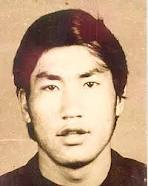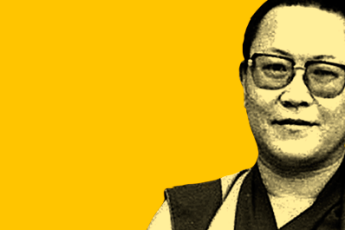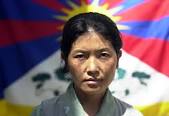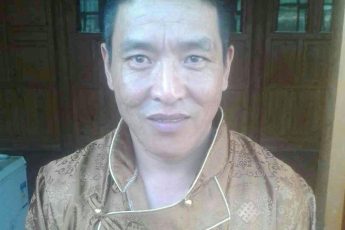Lobsang Tenzin, a courageous born-leader languishing in a Chinese prison since 1988, has continued to fight a lone battle against the might of China’s iron-fist rule in Tibet; today, after nearly quarter of a century in captivity, his body is waning.

Lobsang Tenzin: Tibet's longest-serving political prisoner

The notorious Drapchi Prison, Lhasa, Tibet
In 1988 he was a young, bright Tibetan leader in the prime of his mid twenties. China locked him up in Gutsa Detention Centre accused of the death of a People’s Armed Police (PAP) officer in the aftermath of a protest in Lhasa. He has also been a kept in the notorious Powo Tramo Prison and Drapchi.
With no evidence to prove him guilty, the authority went ahead and slammed him a death sentence with two years reprieve. However, after much international attention and global intervention Lobsang Tenzin received a new lease on life as his death sentence was commuted to life imprisonment in 1991. Since then he has been languishing inside prison cell longing for a day when he would eventually come out and feel the air of freedom.
During his decades in prison, Lobsang Tenzin has always stood firm and resolute in his belief for the cause of Tibet. His solidarity with fellow prisoners for maltreatment from officials were equally lauded. On one occasion he organised the first known mass protest in Drapchi prison following the death of fellow prisoner and activist Lhakpa Tsering. He organized a group of 150 prisoners to carry banners and march through the courtyard [1] of the main prison office demanding transparency in information on the cause of Lhakpa Tsering’s death. On

James Lilley, former US Ambassador: Lobsang Tenzin attempted to pass him a letter about the situation in Drapchi Prison
another occasion he in 1991 he bravely attempted to hand a letter to the then US Ambassador James Lilley who was visiting Drapchi prison. As a result of this action Lobsang and another prisoner were severely tortured, manacled and kept in dark solitary confinement for weeks on a stretch.
He has survived for 23 years under extreme torture at the hands of Chinese prison officers; many of his early-day inmates who have since fled Tibet testified of times when they could no longer endure such atrocities and thought of giving up their lives. No doubt, Lobsang Tenzin is someone who not only withstood the vicious atrocities but also perfected himself in fighting back with equal fervor.
There is no doubt that Lobsang Tenzin is a hero; amongst his fellow prisoners for his display of bravery and courage in leading upfront in confronting Chinese officials, and amongst other Tibetans who thanks him for his brave and undying stand for Tibet.
Recent news of his deteriorating health once again questioned the hope of Lobsang Tenzin being freed alive [2]. We know that he is suffering from diabetes and has severely weakened eyesight and at times blindness. Earlier reports also alert the he developed kidney malfunction and other diseases often found in political prisoners in Tibet, and is suffering psychological trauma. These serious and deadly ailments speak volumes about the atrocities he has faces under Chinese rule.
Lobsang Tenzin is regarded very highly by all the people who have known him. Before his arrest in 1988 he attended Tibet University and, after he was detained he was voted the ‘Best Student of the Year’ on the ground of his “towering figure among the Tibetan students” [4]. The authority of the Tibet Autonomous Region (TAR), realising his popularity, went on a massive propaganda drive; broadcasted his arrest and expulsion from the University through Television, Radio and Newspapers. They even warned all the students at the Tibet University to refrain from indulging in political activities or else they will be met with the same fate as that of Lobsang Tenzin.
The Tibet University has a strong history of political movements with protests calling for the promotion of Tibetan language studies and student uprisings. In 2003 five students of the University formed a clandestine group called “Tibetan Democratic Youth Group and secretively wrote letters to United Nations and political essays [5].
Lobsang Tenzin is the longest serving prisoner alive in Tibet; he is now 46 years old and has spent over half his life as a political prisoner. On 3rd November 2011 John Kamm, founder and chairman of the San Francisco-based Dui Hua (Dialogue) stated at a congressional hearing in Washington that he had requested China to release Lobsang Tenzin on a medical parole considering his severe health issue [6].
Due for official release in April 2013 I pray that he is given medical parole NOW and is allowed to be home in the care of his family and friends.
NOTES:
1. Powo Tramo prison, east of Lhasa, is one of the oldest and notorious labour camps known for imprisoning those with lengthy prison terms.
2. Lobsang Tenzin tore his bed sheet in half and wrote, “We mourn the death of Lhakpa Tsering,” and, “We demand improvement to the conditions of political prisoners,” on the two halves.
3. Longest Serving Tibetan Prisoner in Serious Health Condition, 31 August 2011. http://www.tchrd.org/press/2011/pr20110831.html
4. Death Penalty in China, 2005 Special Report, TCHRD publication.
5. Testimony of Dawa Tashi who was expelled from Tibet University. He was expelled, named and shamed before 3000 strong students of the Tibet University.
6. http://www.rfa.org/english/news/tibet/prisoners-11032011172824.html






